
Hon. Chirau A Mwakwere
___________________________
By OMAR AHMED ALI
THE 62 million dollar question is this; is Ambassador Chirau Ali Mwakwere the emerging Coast political leader? Should his recent elevation to be the region’s populous Mijikenda community spokesperson be read as a sign of more things to come for this humble Matuga MP?
Does this elevation of Mwakwere mean he can not be ignored by NARC Kenya in the race for the vice presidential candidacy within the president’s party? Has he changed the equation of who is going to be the next Kibaki VP should he opt not to pick Moody Awori?
To answer these questions and many more, one has to dig deeper, analyse, and appreciate the intricate politics of Coast province. It is a fact that the seaside province lacks a political leader with a charisma and influence to rally the people by cutting across religious and tribal and party lines. The Transport minister is perhaps the contemporary politician from the region who fits the profile to be the region’s next political leader.
The challenges and hurdles facing the Coastal people when it comes to a unified political leader is the fact that the province is not a tight knit homogeneous society like Central and North Eastern provinces. There are three main tribal and two religious groupings that in one way or another make matters very complex for the province. The tribal groupings include the populous Mijikenda, the Waswahili/Arabs and the upper-Coast based Taitas/Tavetas communities. The two religious groupings are of course the majority Muslims and the strong Christianity presence led by Rev. Kalu, a Mijikenda himself.
Within the Mijikenda (sub-tribes) community there are complex divisions in itself. One major division is the fact that you find the populous Digos who 99 per cent plus adhere to Islamic faith, culturally attached to their Mijikenda kinsmen but connected religiously with their Waswahili/Arabs Muslim brethren and other Kenyan Muslims. The Giriama together with the rest of the smaller sub-tribes majority being Christians —there is a good percentage of Muslims too in this group —whereas they are culturally connected to the Digos, they also identify themselves with the rest of the Christians in the country.
The Taitas/Tavetas on their part regard themselves more as ‘up-country Kenyans’ than being Coastal people. This is perhaps because of the proximity of their location to the ‘up-country Kenya’ and the fact that majority of them are Christian adherents, the majority religion in ‘up-country’ Kenya.
The Waswahili and Arab communities although separate communities, are erroneously counted or bundled as one community in many spheres simply because they both happen to be hundred percent Muslims hence share common Islamic culture. The Waswahili and Arab communities also have their own complex issues although this is not the right forum to discuss them.
Having given this background there is one fundamental common mistake committed frequently by non-native Coastal political commentators, news analysts and journalists when penning political analyses about the region’s politics and Waswahili and Arabs communities. For instance, in their various analyses they only focus on the politics of Mombasa. To them Waswahili, Arabs and Mombasa is ‘what matters’ at the Coast. In addition, these people have a tendency to always consider Mombasa politics to be the politics of the province, as if Mombasa is Coast and Coast is Mombasa. The Mombasa politics that have been personified for many years by the then long serving Mvita MP and former cabinet member the late Sharrif Nassir and later in years by the former Kisauni MP and cabinet minister, Karisa Maitha.
The reality is that majority of Waswhaili and Arabs are not restricted to residing in Mombasa only. And Coast politics transcend outside the province’s largest metropolitan to as far-flung as Kiunga, Faza and Wasini.
Here is one political reality that commentators either deliberately ignore or perhaps lack clear understanding of the political realities of the region. The late Ronald Ngala being the exception to the rule, no Coast politician can become the province’s political leader’, kingmaker, or Mugogo, if he or she does not meet two main pre-requites amongst others qualifications. The kicker is that the person must hail from the Mijikenda community and in tandem must be a Muslim. The reason behind is pretty simple — Mijikenda is the most populous group in the province hence you must earn its respect and support.
Islam is the predominant religion in the province; Muslims in the region will not accept any one who does not believe in Allah as the region’s leader. All other qualifications, including being a Mombasa politician, a cabinet minister, assistant minister, are mere secondary.
The region has witnessed ‘claimers to the throne’ in the name of late Nassir and Maitha. With due respect to the two deceased individuals, these two former Mombasa politicians were claimers to the throne both of them separately came short of one of the two prerequisite for the coveted throne. Nassir was a Mombasa KANU strongman and former President Daniel arap Moi’s Coast’s point man and nothing more. Maitha on his part was Mombasa’s Kibaki-led Democratic Party strongman and the president’s point man in the province. Although the one time Local Government Minister liked to consider himself (and wanted other people to consider him) a Mugogo, he died never attaining such title. The reason why the former Mvita and Kisauni lawmakers could not become the province’s political leaders is because although a Muslim, Nassir was not a Mijikenda.
As for Maitha although he was a Mijikenda from the populous Giriama sub-tribe he was not a Muslim. I guess that is the reason why it was rumoured that Maitha secretly converted to Islam in an effort to get the legitimacy of becoming the political leader of the region.
One can be their respective political parties’ regional coordinators, or strongmen/women for the lack of a better word, but they are not necessarily the regional political leaders. With due respect to the Garsen MP Dunson Mungatana, he is too young, both in his age and politically to appreciate these realities. He came across as making too much noise and was being confused to be ascending to the regional political leadership.
This brings me to see the political importance of the elevation of the Transport minister as the Mijikenda community’s spokesperson. This is perhaps the beginning of the ascending of diplomat-turned politician to the vacuum position of the Coastal political leader. Mwakwere can not be the province’s political leader if he does not want to take the mantle. It is high time for Mwakwere to assume the mantle of the unelected Coast political leadership position that has remained vacant for a long time. The province needs someone who can work for them, can look after their interests et al.
The opportunity has presented itself and he meets the two pre-requisites needed for the position. Mwakwere can be the needed bridge between the differences the Coastal people have. In addition he fits the profile of ‘that missing leader’. He is a Mijikenda from the populous Digo community and is also a Muslim. He is the most educated and with the most government experience of any individual sent to parliament in the history of Coast province.
Although he is not the darling of the press, in fact the media love to hate him. But for those who know him, the Matuga MP is a very humble politician. Despite his closeness to President Mwai Kibaki, the man is still humble and never cocky or arrogant. Listen to what he said upon his elevation to be his community’s spokesperson: “I am not a king of the community but just their spokesman, each one of us is a leader in our own right.” Unlike some politicians one hardly sees the Matuga MP chest-thumping. He works very well with President Kibaki, his cabinet colleagues and fellow lawmakers.
Looking at his background, this is an individual who started his career from the scratch as a school teacher in Kilifi district who was ambitious and eventually attained two degrees from two highly respected United Kingdom’s universities. In his earlier life the Matuga MP spent many years in Mombasa while teaching at the then MIOME, now Mombasa Polytechnic. He was also the pioneer Principal of Kenya Ports Authority’s Bandari College. Before venturing into politics, he had served our country diligently as our diplomat in Zimbabwe and in the United Arab Emirates.
It is high time that a Coastal politician is considered for the number two slot and there is no better individual from the province who fits such a profile and who is close to the president than the Matuga lawmaker. When would the smaller Kenyan communities be able to at least have a vice president of the country? If the time will ever come for some one from a smaller community be named to the number two slot, then that time is in this year’s general election and no other. It is under Kibaki that the Coast people have been treated as equal citizens of Kenya in terms of appointments and spearheading developments. By picking Mwakwere as his running mate Kibaki will satisfy two major constituencies in tandem, — the Coast province and the entire Kenya Muslim community.
omarahmedali@gmail.com
http://www.timesnews.co.ke/09jan07/editorials/comm1.html
Does this elevation of Mwakwere mean he can not be ignored by NARC Kenya in the race for the vice presidential candidacy within the president’s party? Has he changed the equation of who is going to be the next Kibaki VP should he opt not to pick Moody Awori?
To answer these questions and many more, one has to dig deeper, analyse, and appreciate the intricate politics of Coast province. It is a fact that the seaside province lacks a political leader with a charisma and influence to rally the people by cutting across religious and tribal and party lines. The Transport minister is perhaps the contemporary politician from the region who fits the profile to be the region’s next political leader.
The challenges and hurdles facing the Coastal people when it comes to a unified political leader is the fact that the province is not a tight knit homogeneous society like Central and North Eastern provinces. There are three main tribal and two religious groupings that in one way or another make matters very complex for the province. The tribal groupings include the populous Mijikenda, the Waswahili/Arabs and the upper-Coast based Taitas/Tavetas communities. The two religious groupings are of course the majority Muslims and the strong Christianity presence led by Rev. Kalu, a Mijikenda himself.
Within the Mijikenda (sub-tribes) community there are complex divisions in itself. One major division is the fact that you find the populous Digos who 99 per cent plus adhere to Islamic faith, culturally attached to their Mijikenda kinsmen but connected religiously with their Waswahili/Arabs Muslim brethren and other Kenyan Muslims. The Giriama together with the rest of the smaller sub-tribes majority being Christians —there is a good percentage of Muslims too in this group —whereas they are culturally connected to the Digos, they also identify themselves with the rest of the Christians in the country.
The Taitas/Tavetas on their part regard themselves more as ‘up-country Kenyans’ than being Coastal people. This is perhaps because of the proximity of their location to the ‘up-country Kenya’ and the fact that majority of them are Christian adherents, the majority religion in ‘up-country’ Kenya.
The Waswahili and Arab communities although separate communities, are erroneously counted or bundled as one community in many spheres simply because they both happen to be hundred percent Muslims hence share common Islamic culture. The Waswahili and Arab communities also have their own complex issues although this is not the right forum to discuss them.
Having given this background there is one fundamental common mistake committed frequently by non-native Coastal political commentators, news analysts and journalists when penning political analyses about the region’s politics and Waswahili and Arabs communities. For instance, in their various analyses they only focus on the politics of Mombasa. To them Waswahili, Arabs and Mombasa is ‘what matters’ at the Coast. In addition, these people have a tendency to always consider Mombasa politics to be the politics of the province, as if Mombasa is Coast and Coast is Mombasa. The Mombasa politics that have been personified for many years by the then long serving Mvita MP and former cabinet member the late Sharrif Nassir and later in years by the former Kisauni MP and cabinet minister, Karisa Maitha.
The reality is that majority of Waswhaili and Arabs are not restricted to residing in Mombasa only. And Coast politics transcend outside the province’s largest metropolitan to as far-flung as Kiunga, Faza and Wasini.
Here is one political reality that commentators either deliberately ignore or perhaps lack clear understanding of the political realities of the region. The late Ronald Ngala being the exception to the rule, no Coast politician can become the province’s political leader’, kingmaker, or Mugogo, if he or she does not meet two main pre-requites amongst others qualifications. The kicker is that the person must hail from the Mijikenda community and in tandem must be a Muslim. The reason behind is pretty simple — Mijikenda is the most populous group in the province hence you must earn its respect and support.
Islam is the predominant religion in the province; Muslims in the region will not accept any one who does not believe in Allah as the region’s leader. All other qualifications, including being a Mombasa politician, a cabinet minister, assistant minister, are mere secondary.
The region has witnessed ‘claimers to the throne’ in the name of late Nassir and Maitha. With due respect to the two deceased individuals, these two former Mombasa politicians were claimers to the throne both of them separately came short of one of the two prerequisite for the coveted throne. Nassir was a Mombasa KANU strongman and former President Daniel arap Moi’s Coast’s point man and nothing more. Maitha on his part was Mombasa’s Kibaki-led Democratic Party strongman and the president’s point man in the province. Although the one time Local Government Minister liked to consider himself (and wanted other people to consider him) a Mugogo, he died never attaining such title. The reason why the former Mvita and Kisauni lawmakers could not become the province’s political leaders is because although a Muslim, Nassir was not a Mijikenda.
As for Maitha although he was a Mijikenda from the populous Giriama sub-tribe he was not a Muslim. I guess that is the reason why it was rumoured that Maitha secretly converted to Islam in an effort to get the legitimacy of becoming the political leader of the region.
One can be their respective political parties’ regional coordinators, or strongmen/women for the lack of a better word, but they are not necessarily the regional political leaders. With due respect to the Garsen MP Dunson Mungatana, he is too young, both in his age and politically to appreciate these realities. He came across as making too much noise and was being confused to be ascending to the regional political leadership.
This brings me to see the political importance of the elevation of the Transport minister as the Mijikenda community’s spokesperson. This is perhaps the beginning of the ascending of diplomat-turned politician to the vacuum position of the Coastal political leader. Mwakwere can not be the province’s political leader if he does not want to take the mantle. It is high time for Mwakwere to assume the mantle of the unelected Coast political leadership position that has remained vacant for a long time. The province needs someone who can work for them, can look after their interests et al.
The opportunity has presented itself and he meets the two pre-requisites needed for the position. Mwakwere can be the needed bridge between the differences the Coastal people have. In addition he fits the profile of ‘that missing leader’. He is a Mijikenda from the populous Digo community and is also a Muslim. He is the most educated and with the most government experience of any individual sent to parliament in the history of Coast province.
Although he is not the darling of the press, in fact the media love to hate him. But for those who know him, the Matuga MP is a very humble politician. Despite his closeness to President Mwai Kibaki, the man is still humble and never cocky or arrogant. Listen to what he said upon his elevation to be his community’s spokesperson: “I am not a king of the community but just their spokesman, each one of us is a leader in our own right.” Unlike some politicians one hardly sees the Matuga MP chest-thumping. He works very well with President Kibaki, his cabinet colleagues and fellow lawmakers.
Looking at his background, this is an individual who started his career from the scratch as a school teacher in Kilifi district who was ambitious and eventually attained two degrees from two highly respected United Kingdom’s universities. In his earlier life the Matuga MP spent many years in Mombasa while teaching at the then MIOME, now Mombasa Polytechnic. He was also the pioneer Principal of Kenya Ports Authority’s Bandari College. Before venturing into politics, he had served our country diligently as our diplomat in Zimbabwe and in the United Arab Emirates.
It is high time that a Coastal politician is considered for the number two slot and there is no better individual from the province who fits such a profile and who is close to the president than the Matuga lawmaker. When would the smaller Kenyan communities be able to at least have a vice president of the country? If the time will ever come for some one from a smaller community be named to the number two slot, then that time is in this year’s general election and no other. It is under Kibaki that the Coast people have been treated as equal citizens of Kenya in terms of appointments and spearheading developments. By picking Mwakwere as his running mate Kibaki will satisfy two major constituencies in tandem, — the Coast province and the entire Kenya Muslim community.
omarahmedali@gmail.com
http://www.timesnews.co.ke/09jan07/editorials/comm1.html
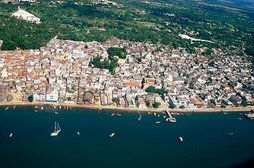
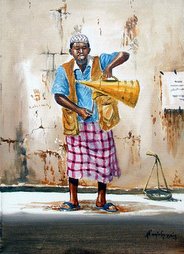
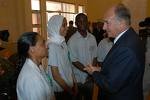
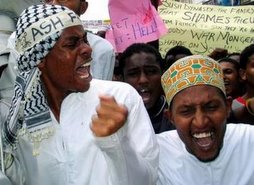
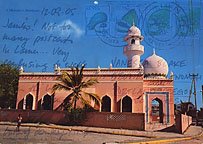
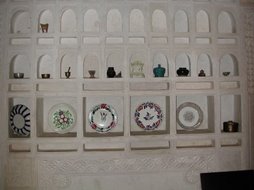
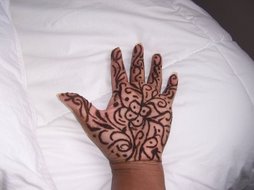
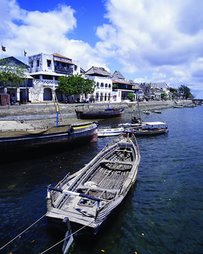
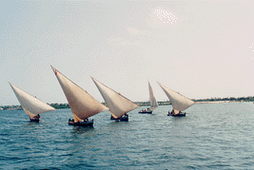
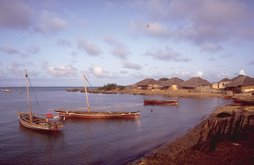


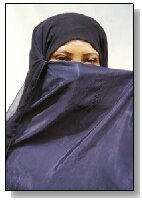
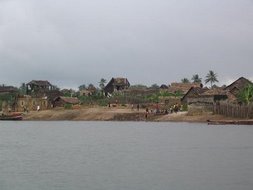
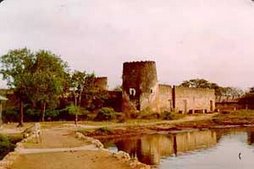
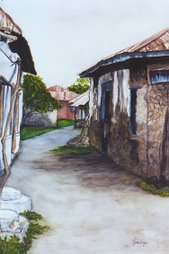
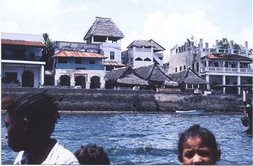

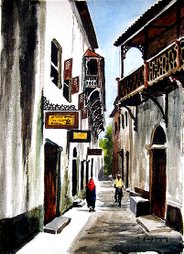
No comments:
Post a Comment